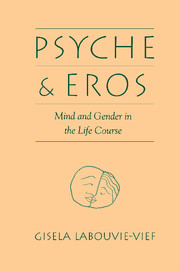Book contents
- Frontmatter
- Contents
- Acknowledgments
- 1 Prelude
- PART I THE MIND DIVIDED
- PART II THE MIND RESTORED
- 5 Knife and lamp: Mythos rediscovered
- 6 Psyche's trials: The transformation of desire
- 7 Postlude: The sacred marriage
- Appendix: List of goddesses, gods, other mythological figures, and sacred sites
- Notes
- References
- Author index
- Subject index
6 - Psyche's trials: The transformation of desire
Published online by Cambridge University Press: 06 July 2010
- Frontmatter
- Contents
- Acknowledgments
- 1 Prelude
- PART I THE MIND DIVIDED
- PART II THE MIND RESTORED
- 5 Knife and lamp: Mythos rediscovered
- 6 Psyche's trials: The transformation of desire
- 7 Postlude: The sacred marriage
- Appendix: List of goddesses, gods, other mythological figures, and sacred sites
- Notes
- References
- Author index
- Subject index
Summary
Eros flew away to his mother's temple, lying in her chamber and groaning from the wound the lamp had dealt him. Psyche, however, began to wander in search of her lover. At length she arrived at the temple of the enraged Goddess, and to satisfy her vengeful spirit, Aphrodite set Psyche several impossible tasks.
In the first task, Psyche was to sort a heap of different grains – corn, barley, millet and poppy seeds, chick peas and lentils and different kinds of beans – and sort it out all before day's end. Next, Aphrodite asked her to gather some fleece from the golden rams. Next, she was to bring some water of life from the holy river Styx.
Now Aphrodite had designed each of those tasks to plot the ruin of Psyche, and the young woman despaired at being able to do the impossible. But first, the ants came and sorted all the grains into different heaps, each after their kind. When she came to the river close to the rams' grazing place, the reeds told her to wait till sundown when the rams go to sleep, then to gather some wool from the bushes. Finally, Zeus himself sent an eagle who filled Psyche's urn with the holy water.
But still the Goddess was not appeased, and invented yet another task. Psyche must descend to the Underworld, there to gather some beauty ointment from Persephone. Now, a tower instructed her to be firm on her way: Psyche should steel her heart to the pitiful cries of the miserable souls who ask for her mercy and help, and thus obtain the box with the ointment from the Goddess of the Underworld.
- Type
- Chapter
- Information
- Psyche and ErosMind and Gender in the Life Course, pp. 208 - 252Publisher: Cambridge University PressPrint publication year: 1994



